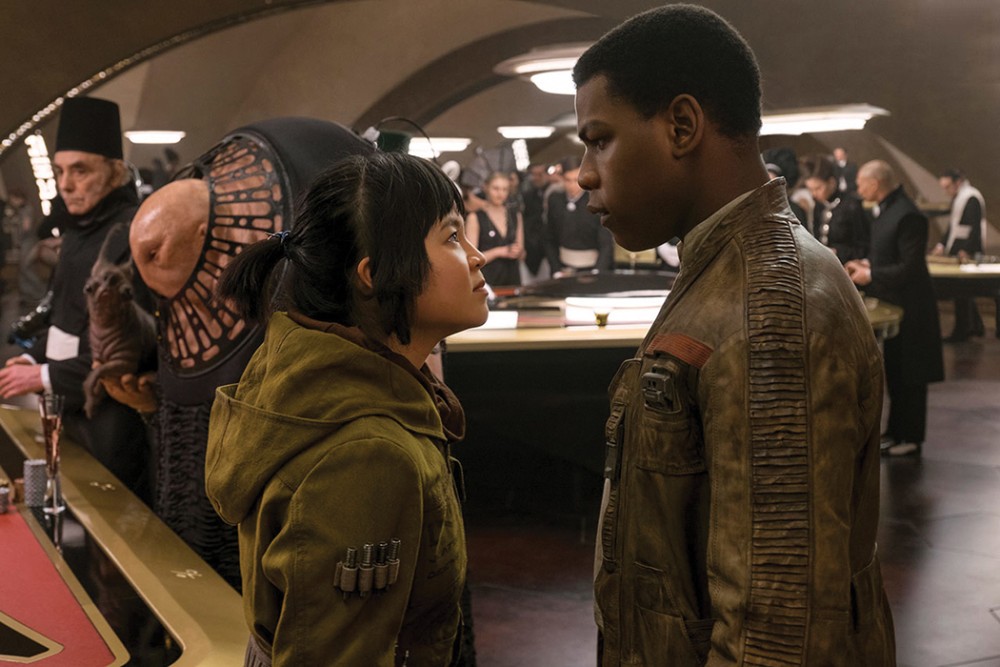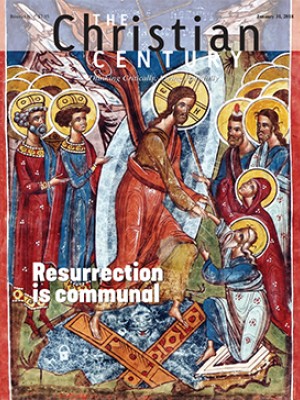The Last Jedi's theology of power
The new Star Wars movie calls solo heroism into question—and offers a vision of communal goodness.

A long time ago in a galaxy far, far away, myths about good and evil are being rewritten. The eighth canonical installment of the Star Wars series winks and nods at the mythos that the franchise has been building for decades. Like Princess Leia giving an order to Poe Dameron, it corrects course firmly but kindly in the direction of a more expansive and theologically interesting universe.
The Last Jedi picks up where the previous movie, The Force Awakens, left off. The First Order has destroyed the Republic and subjugated the galaxy. A scrappy band of resistance fighters struggles to keep hope alive. An emissary has been dispatched to find the last Jedi to rally people to the light.
Read our latest issue or browse back issues.
We saw variations on this story in the first Star Wars film (A New Hope) and again in The Force Awakens. The cycles of the generations are hardwired into the Star Wars mythos. Luke Skywalker, son of Anakin Skywalker (later Darth Vader) discovers his parentage and becomes Anakin’s only chance at redemption. Where Anakin had turned to the darkness, his son chooses the light, marshaling the power of his bloodline while resisting its weakness.
Episodes I–III press the origin story further back: Where did Anakin’s power come from and how did he turn to the darkness? As most fans will tell you, the films’ answers were not satisfying. They hint at virgin birth and supercharged DNA. The switch from light to darkness is so sudden it suggests a hostile take-over rather than a series of choices with moral consequences.
Characters in The Last Jedi are also obsessed with bloodlines, but this film changes what heritage means, especially as it figures in the relationship between Rey, the heroine, and Kylo Ren, the son of Han Solo and Leia Organa and grandson of Darth Vader. Kylo is determined to fulfill his grandfather’s mastery of the Force through total submission to the dark side, convinced that a powerful evil flows through his blood. Rey, like Luke at the start of Episode IV, is an orphan in search of her place in this mythology.
Supreme Leader Snoke, the newest “big bad” of the third trilogy, tells Rey that she is the Force’s natural answer to Kylo’s power: as darkness grows, a powerful light will rise to meet it. In Snoke’s theology, darkness and light are fixed quantities in Rey and Kylo. But the film suggests a much less Manichaean universe: Kylo and Rey grow together, shaping each other’s souls. The outcome of this mutual influence remains to be seen, but it’s the most meaningful relationship in The Last Jedi.
Some fans have balked at the suggestion that the Force blows where it will, not necessarily through bloodlines and heritage. But this subtle modification of the story is part of an even larger rewriting of the rules of heroism that the trilogy undertakes.
Much has been made of the film’s commitment to racial and gender diversity in the casting. From central characters to the extras flying the bombers, white men are in the minority. But the film doesn’t just replace white men with browner versions that are up to the same old hijinks. It calls the very idea of solo heroism into question. There are plenty of daring heroics in The Last Jedi and no shortage of characters who want to step into Luke’s or Han’s shoes, but now that impulse is shown to just make things worse.
A good portion of the movie is spent following characters zipping around the galaxy to pull off an impossible rescue mission. Everything that can go wrong goes wrong. The lesson, however, is not that persistence wins the day. The hair-brained rescue scheme causes unspeakable destruction to the very people it is meant to help. The hardest lesson to learn is not how to prepare for heroic death, but how to live with collaborative power. It is, after all, a republic the resistance is always striving to reestablish.
The Last Jedi powerfully articulates a new theology of power. Light and darkness are not equal powers in this universe, bound in some inextricable dance, as Snoke or many of the earlier films suggested. Light does not just rise to balance darkness. Instead, goodness proposes an entirely different vision of life itself. Evil insists on control and domination and exerts itself through force and violence. Goodness in Star Wars is democratic, noncoercive, and communal. Goodness persists in choosing to see the interconnectedness of all things and nurturing those connections. And as Luke insists from his self-imposed exile, this power belongs no more to the Jedi than to the stable boy living in slavery.
This vision of goodness is why the Star Wars story keeps repeating itself. The threat of its perversion in dictatorships or hotshot heroics is always present. Democracies—in Star Wars and in our own galaxy—are fragile and provisional. They need continued, collaborative commitment to survive. That this power depends on nothing more and nothing less than the human will helps to explain why we need to hear the story again and again.
A version of this article appears in the January 31 print edition under the title “Theology of power.”






